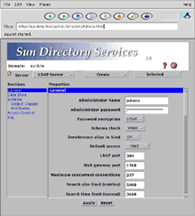Sun jumps on LDAP bandwagon
Applications to follow...
|
|
Sun jumps on LDAP bandwagonApplications to follow...
|
|
Mail this article to a friend |
Sun Directory Services is based on LDAP server source code licensed from the University of Michigan. Sun says the product will be used as a central point for storing information about different objects on the network. It features a Java Management API (JMAPI)-based configuration tool, a replication server, and a SNMP mail and directory management agent.
Sun says its replication server is unique because it can do partial replication of LDAP information. It could be used, for example, to replicate names and email addresses of company employees, but not phone numbers, to a second server. Sun says that clients and applications will be able to query its directory server via HTTP as well as LDAP.

Sun Directory Services 1.0 |
For those customers who are not interested in migrating their directory repository, the announcement seems more significant as a statement of Sun's direction.
Analysts say Sun's move to support LDAP comes none too soon. Acording to Gartner Group research director Neil MacDonald, "they're entering the market kind of late. The directory market is pretty mature and we expect the market to go through some consolidation." Indeed, with Microsoft planning to give away its directory services in NT 5.0 and Netscape recently announcing that its Netscape Directory Server would be included for free in SuiteSpot, Sun's product -- priced at $1,000 -- may not be an easy sell.
MacDonald says, "for large organizations this is not a great announcement. They do not want another directory. But the good news is that Sun will support LDAP."
Sun product manager Etienne Remillon says that the upcoming version 3.0 of the Sun Internet Mail Server will come with LDAP support. But he declined to mention other specific implementations, saying only that LDAP would eventually make its way into user profiling, as well as network and inventory management applications.
MacDonald agrees that the LDAP server would make an interesting addition to Sun's upcoming Enterprise and Internet Service add-on modules for Solaris, but he says that small and mid-sized organizations that do not have a directory could be interested in the product by itself. Sun's Remillon would not say whether or not Sun Directory Services would be included in any Solaris products.
Full synchronization with other directory repositories will not be available in version 1.0, according to Remillon, but it will come in the next release, six to 12 months from now. Data from a NIS database can presently be bulk-loaded into Sun Directory Services 1.0, but even this feature is not yet available for NIS+. Says Remillon, "we're working on that."
As for Novell Directory Services (NDS), though Sun announced it would support NDS last November, these services do not appear to figure prominently in Sun's directory strategy. MacDonald says "Sun will ship NDS for Solaris, but the integration won't be there. That means that Sun's embrace of NDS is pretty lack- lustre."
Sun Directory Services will ship in September.
![]()
|
|
Resources
If you have technical problems with this magazine, contact webmaster@sunworld.com
URL: http://www.sunworld.com/swol-07-1997/swol-07-sds.html
Last modified: